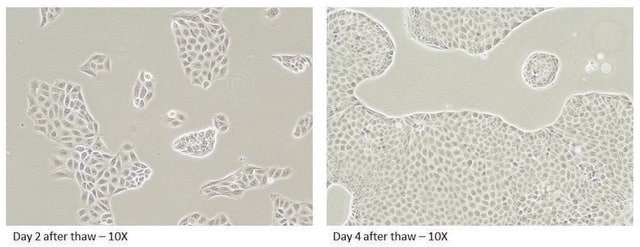CHSE-214
21714, fish embryo, Fibroblast-like
Synonym(s):
CHSE/F
Sign Into View Organizational & Contract Pricing
All Photos(1)
About This Item
UNSPSC Code:
41106514
Recommended Products
product name
CHSE-214, 00021714
biological source
fish embryo
growth mode
Adherent
karyotype
Not specified
morphology
Fibroblast-like
products
Not specified
receptors
Not specified
technique(s)
cell culture | mammalian: suitable
shipped in
dry ice
storage temp.
−196°C
Cell Line Origin
Common bluegill (Lepomis macrochirus), normal
Cell Line Description
The fish line CHSE/F was derived from Common bluegill (Lepomis macrochirus) embryo. It is susceptible to various fish viruses including infectious hematopoietic necrosis virus (IHNV); viral haemorrhagic septicaemia virus (VHSV); spring viraemia of carp virus (SVCV); and infectious pancreatic necrosis virus (IPNV).
ECACC has been advised by the CCLV that this cell line is derived from Lepomis macrochirus (Common bluegill) not Oncorhynchus tshawytscha (Chinook salmon) as originally reported. This has been confirmed by DNA sequencing at ECACC. The CCLV have changed the cell line name to CHSE/F to indicate this. The line is used in viral diagnostics and gives better results than BF-2 (Sigma Catalogue number 00021712), a commonly used cell line of Lepomis macrochirus. The sequence of both lines (BF-2 and CHSE/F possess the same nucleotide exchange but are different in culture behaviour and in virus propagation.
ECACC has been advised by the CCLV that this cell line is derived from Lepomis macrochirus (Common bluegill) not Oncorhynchus tshawytscha (Chinook salmon) as originally reported. This has been confirmed by DNA sequencing at ECACC. The CCLV have changed the cell line name to CHSE/F to indicate this. The line is used in viral diagnostics and gives better results than BF-2 (Sigma Catalogue number 00021712), a commonly used cell line of Lepomis macrochirus. The sequence of both lines (BF-2 and CHSE/F possess the same nucleotide exchange but are different in culture behaviour and in virus propagation.
Application
Fish virus studies
Culture Medium
EMEM (EBSS) (M2279) + 2mM L-Glutamine (G7513) + 1% Non Essential Amino Acids(NEAA) (M7145) + 120mg/l Sodium Pyruvate(NaP) (S8636) + 10% FBS / FCS (F2442).
Subculture Routine
Split sub-confluent cultures (70-80%) 1:4 to 1:6 using 0.25% trypsin or trypsin/EDTA; grow cells in dark (e.g. wrapped in foil) at 20-26ºC with 26ºC optimum temperature; monolayer is stable for at least 10 days with maintenance medium containing 1-2% FBS.
Other Notes
Additional freight & handling charges may be applicable for Asia-Pacific shipments. Please check with your local Customer Service representative for more information.
Certificates of Analysis (COA)
Search for Certificates of Analysis (COA) by entering the products Lot/Batch Number. Lot and Batch Numbers can be found on a product’s label following the words ‘Lot’ or ‘Batch’.
Already Own This Product?
Find documentation for the products that you have recently purchased in the Document Library.
Our team of scientists has experience in all areas of research including Life Science, Material Science, Chemical Synthesis, Chromatography, Analytical and many others.
Contact Technical Service

